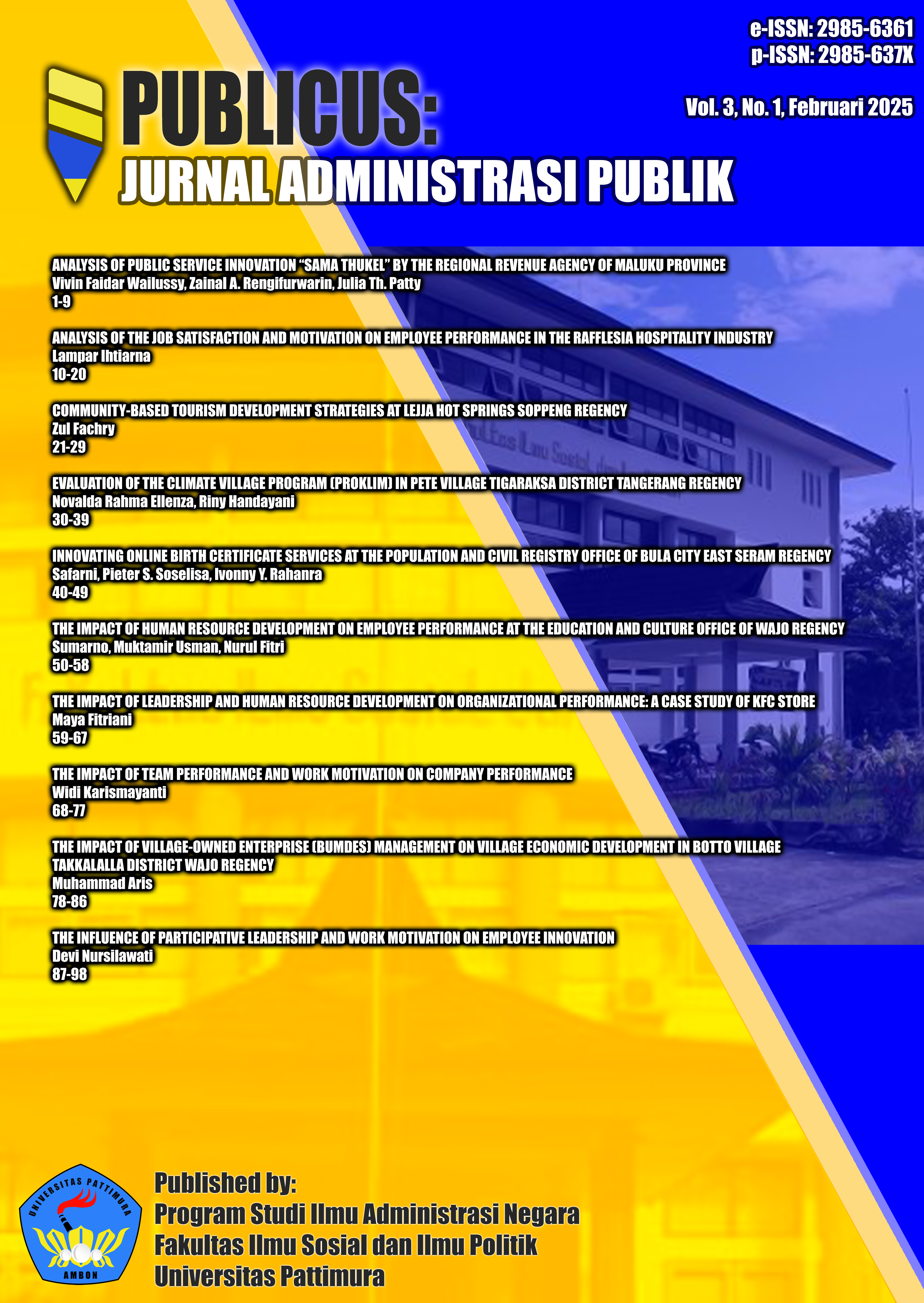Analysis of Public Service Innovation "Sama Thukel" by the Regional Revenue Agency of Maluku Province
Abstract
This research aims to analyze the public service innovation "Sama Thukel" implemented by the Regional Revenue Agency of Maluku Province. Public service innovation is a critical element for improving the quality of governance and enhancing the public's trust in government institutions. "Sama Thukel" is a digital-based public service innovation designed to facilitate taxpayers' access to regional tax services, ensuring efficient and transparent processes. Through qualitative methods, including interviews and document analysis, the study explores the design, implementation, challenges, and impact of this innovation on taxpayers and the agency itself. The findings reveal that the "Sama Thukel" program has significantly improved taxpayer compliance, reduced bureaucratic inefficiencies, and created a more transparent and accountable system. However, challenges remain in terms of digital literacy and the need for continuous system upgrades. This research highlights the importance of adapting public service innovations to local contexts and the role of technology in enhancing governance. The study concludes by offering recommendations for optimizing the "Sama Thukel" program and ensuring its sustainability.
Downloads
References
Alm, J., McClelland, G. H., & Schulze, W. D. (1992). Why do people pay taxes? Journal of Public Economics, 48(1), 21-38.
Aminullah, A., & Widayati, S. (2020). Digital Literacy in Indonesia: Challenges and Opportunities. International Journal of Digital Literacy and Digital Competence, 9(3), 45-60.
Braun, V., & Clarke, V. (2006). Using thematic analysis in psychology. Qualitative Research in Psychology, 3(2), 77-101.
Cheung, C. M. K., & Lee, M. K. O. (2020). E-Government Adoption in Asia: The Role of Digital Literacy. Telematics and Informatics, 37, 30-42.
Deininger, K., & Mpuga, P. (2005). Economic and Social Impacts of the Property Tax in Developing Countries: A Review of the Literature. World Development, 33(4), 381-398.
Gaviria, A. (2020). The State of Bureaucracy in Developing Countries. International Development Review, 32(2), 142-158.
Government of Indonesia. (2020). Indonesia Digital Literacy Report 2020. Ministry of Communication and Information Technology.
Ismail, A., & Osman, A. (2022). Government Transparency and Public Trust in Developing Economies. International Journal of Public Administration, 45(2), 101-117.
OECD. (2019). Public Service Innovation in the Digital Age. OECD Digital Government Studies, OECD Publishing, Paris.
Peters, B. G. (2018). The Politics of Bureaucracy. Routledge.
Setiawan, D., & Kurniawan, A. (2021). Digital Government and Public Services in Indonesia: Opportunities and Challenges. International Journal of Public Administration, 44(7), 572-589.
Slemrod, J., & Webley, P. (2010). The Role of Taxpayer Attitudes in Compliance Behavior. Handbook of Tax Evasion and Compliance, 74-90.
Verger, A. (2019). Public Sector Innovation: Concepts and Approaches. Public Administration Review, 79(3), 316-327.
Weber, M. (2015). Max Weber on the Methodology of the Social Sciences. Free Press.
World Bank. (2017). Digital Government: Transforming Public Service Delivery. World Bank Group.
World Economic Forum. (2021). The Future of Government Technology in a Digital Age. WEF Publishing.
Xu, J., & Yao, L. (2021). Exploring Digital Government and Citizen Engagement: Evidence from Developing Countries. International Journal of Public Sector Management, 34(1), 76-91.
Zhang, T., & Liu, Z. (2020). E-Government and Taxpayer Compliance: A Review of Recent Studies. Government Information Quarterly, 37(2), 123-135.
Zhu, D., & Wang, X. (2021). Leveraging Digital Platforms to Improve Public Services: A Case Study from China. Public Management Review, 23(6), 789-807.
Zolfaghari, M., & Hajialiasghari, F. (2018). Digital Innovation in Public Administration: A Systematic Literature Review. Public Administration Review, 78(4), 613-626.
Copyright (c) 2025 Vivin Faidar Wailussy, Zainal A. Rengifurwarin, Julia Th. Patty

This work is licensed under a Creative Commons Attribution 4.0 International License.





.png)




